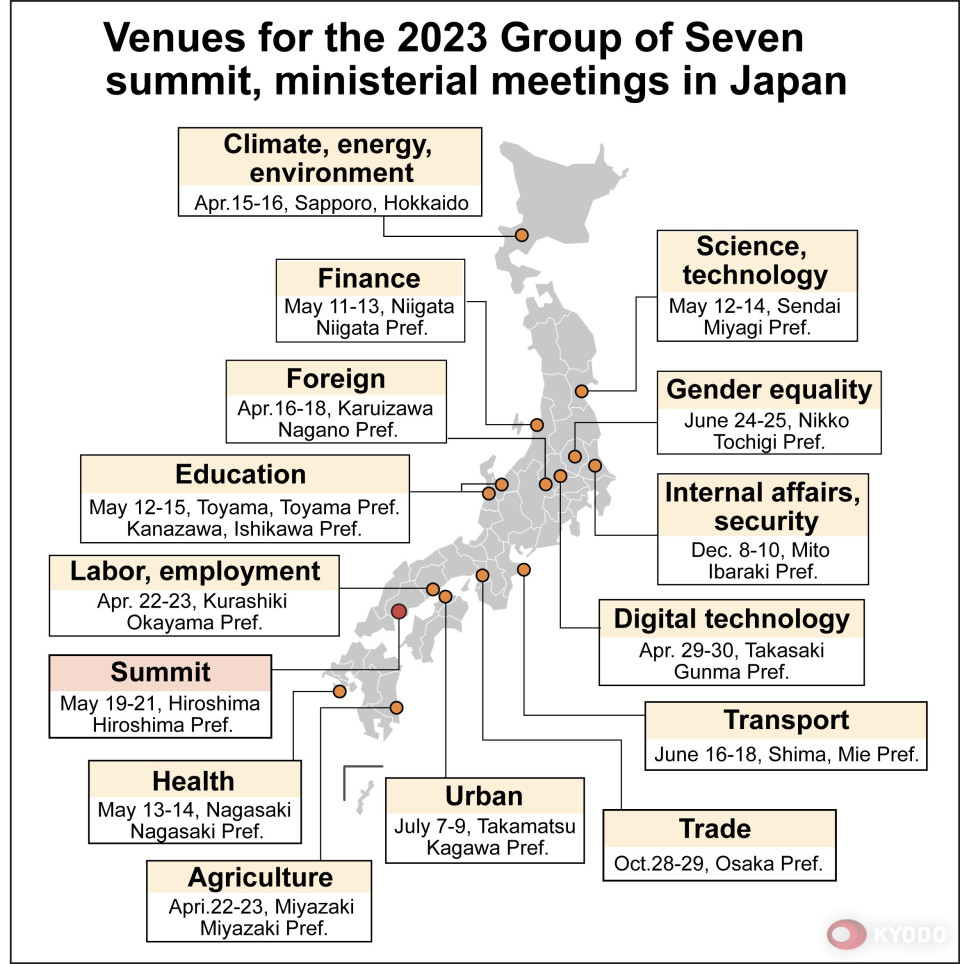After hosting a Group of Seven online summit on the first anniversary of the Ukraine crisis, Japan, the G-7 chair in 2023, faces growing expectations from other members and international organizations to increase focus on other global issues by leveraging its strengths in non-military areas.
Japan, for example, could contribute toward promoting universal health care coverage to other countries by offering expertise on its own system, as the Asian nation has provided public medical insurance for all its citizens since 1961, analysts said.
With the World Health Organization calling on the G-7 to phase out their reliance on fossil fuels to curtail global warming and pollution, Japan could also play a leading role in the international community by advocating and investing in decarbonization technology, they added.

Japan, meanwhile, has been urged to explain to its G-7 counterparts its plan to discharge treated water from its crippled nuclear power plant in Fukushima Prefecture into the Pacific Ocean, a decision which has been met with strong resistance from some neighboring nations.
Prime Minister Fumio Kishida, who represents a constituency in Hiroshima as a lawmaker, is scheduled to host the in-person G-7 summit for three days from May 19 in the western Japan city that was devastated by a U.S. atomic bomb in August 1945.
Kishida has been "keen to pitch his vision of a world without nuclear weapons" amid mounting fears that Russia may deploy one in its war against Ukraine, but there are "many other issues that should also be discussed at the G-7 summit," a source close to him said.
"In thinking seriously about what Japan can and should do for the international community as the G-7 presidency, the prime minister needs to take the initiative and combat global challenges this year," said the source.
On Friday, the G-7 leaders held a video meeting for the first summit presided over by Kishida, in an effort to strengthen the unity of the group and demonstrate its unwavering solidarity with Ukraine. President Volodymyr Zelenskyy attended the gathering.
The G-7 members "called on Russia to stop its ongoing aggression and to immediately, completely and unconditionally withdraw its troops" from Ukraine, warning in their joint statement that Moscow's "irresponsible nuclear rhetoric is unacceptable."
The statement suggested that the leaders of the G-7 -- which consists of Britain, Canada, France, Germany, Italy, Japan and the United States plus the European Union -- devoted most of their time to discussing Russia's invasion of Ukraine.
The source said, "To be honest, what Japan can do for Ukraine as the G-7 chair is limited" compared with other countries, as Tokyo "cannot supply military assistance" to the Eastern European nation under its war-renouncing Constitution.
Kishida should "try to bolster his influence in the G-7 by pledging to utilize Japan's state-of-the-art technologies and experience in fields such as medicine and environmental science to help solve global problems," the source added.

In medicine and health care, Japan has accumulated knowledge in universal health coverage for more than 60 years.
Since the United Nations adopted its Sustainable Development Goals in 2015, the G-7 has pursued the realization of universal health coverage to ensure people have access to basic medical services without financial hardship.
In many emerging countries, it is difficult to expand health care infrastructure, meaning Japan could offer its expertise by providing insurance-based services, Sumitomo Mitsui Trust Asset Management Co. said in a report.
"Japan's universal health insurance system has helped improve the life expectancy of its citizens" and buoy economic growth "through disease control," the investment firm said, adding Tokyo should cooperate with other G-7 members in the area.
Moreover, the WHO has recently emphasized the importance of achieving "planetary health," a concept that links human health with the earth's natural ecosystems, requesting that the G-7 work with them to sharply reduce fossil fuel use.
Japan has promised to become carbon neutral through its plan to produce net zero greenhouse gas emissions by 2050, accelerating research and development in renewable energy technologies and other resource sectors.
The Health and Global Policy Institute, a Japanese private think tank, said it hopes that the Kishida administration will lead the discussion on how to attain the goal of improving planetary health as the G-7 presidency.
The G-7 health ministerial meeting is slated to be held in May in the southwestern city of Nagasaki, the second city to be hit by a U.S. atomic bomb days before Japan's surrender in World War II.
At a planned gathering in April for energy ministers in Sapporo, northern Japan, the government is expected to seek the endorsement of the G-7 for the disposal of treated water from the Fukushima plant, apparently brushing aside concerns raised by China and South Korea.
The Global Times, a Chinese newspaper affiliated with the country's ruling Communist Party, lambasted Japan, saying Tokyo's "attempt to draw other G-7 members over to its side is through hosting a G-7 meeting, a platform where it is easiest to reach consensus."
"Tokyo's aim is very obvious. This is also a kind of public opinion manipulation to cover up its own wrongdoing," the newspaper said, adding its dispose of the "nuclear-contaminated" water would affect the earth's oceans.
The nuclear disaster at the Fukushima power plant was triggered by a powerful earthquake and tsunami in March 2011.
Related coverage:
G-7 vows to strengthen coordinated sanctions on Russia over Ukraine

 By Tomoyuki Tachikawa,
By Tomoyuki Tachikawa,









